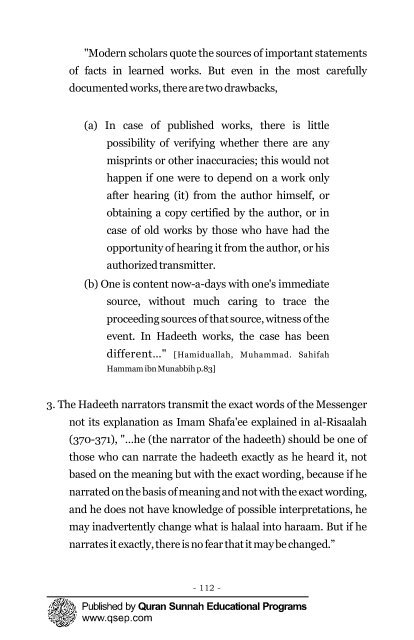Create successful ePaper yourself
Turn your PDF publications into a flip-book with our unique Google optimized e-Paper software.
"Modern scholars quote the sources of important statements<br />
of facts in learned works. But even in the most carefully<br />
documented works, there are two drawbacks,<br />
(a) In case of published works, there is little<br />
possibility of verifying whether there are any<br />
misprints or other inaccuracies; this would not<br />
happen if one were to depend on a work only<br />
after hearing (it) from the author himself, or<br />
obtaining a copy certified by the author, or in<br />
case of old works by those who have had the<br />
opportunity of hearing it from the author, or his<br />
authorized transmitter.<br />
(b) One is content now-a-days with one's immediate<br />
source, without much caring to trace the<br />
proceeding sources of that source, witness of the<br />
event. In Hadeeth works, the case has been<br />
different…"<br />
Hammam ibn Munabbih p.83]<br />
[Hamiduallah, Muhammad. Sahifah<br />
3. The Hadeeth narrators transmit the exact words of the Messenger<br />
not its explanation as Imam Shafa'ee explained in al-Risaalah<br />
(370-371), "…he (the narrator of the hadeeth) should be one of<br />
those who can narrate the hadeeth exactly as he heard it, not<br />
based on the meaning but with the exact wording, because if he<br />
narrated on the basis of meaning and not with the exact wording,<br />
and he does not have knowledge of possible interpretations, he<br />
may inadvertently change what is halaal into haraam. But if he<br />
narrates it exactly, there is no fear that it may be changed.”<br />
- 112 -


